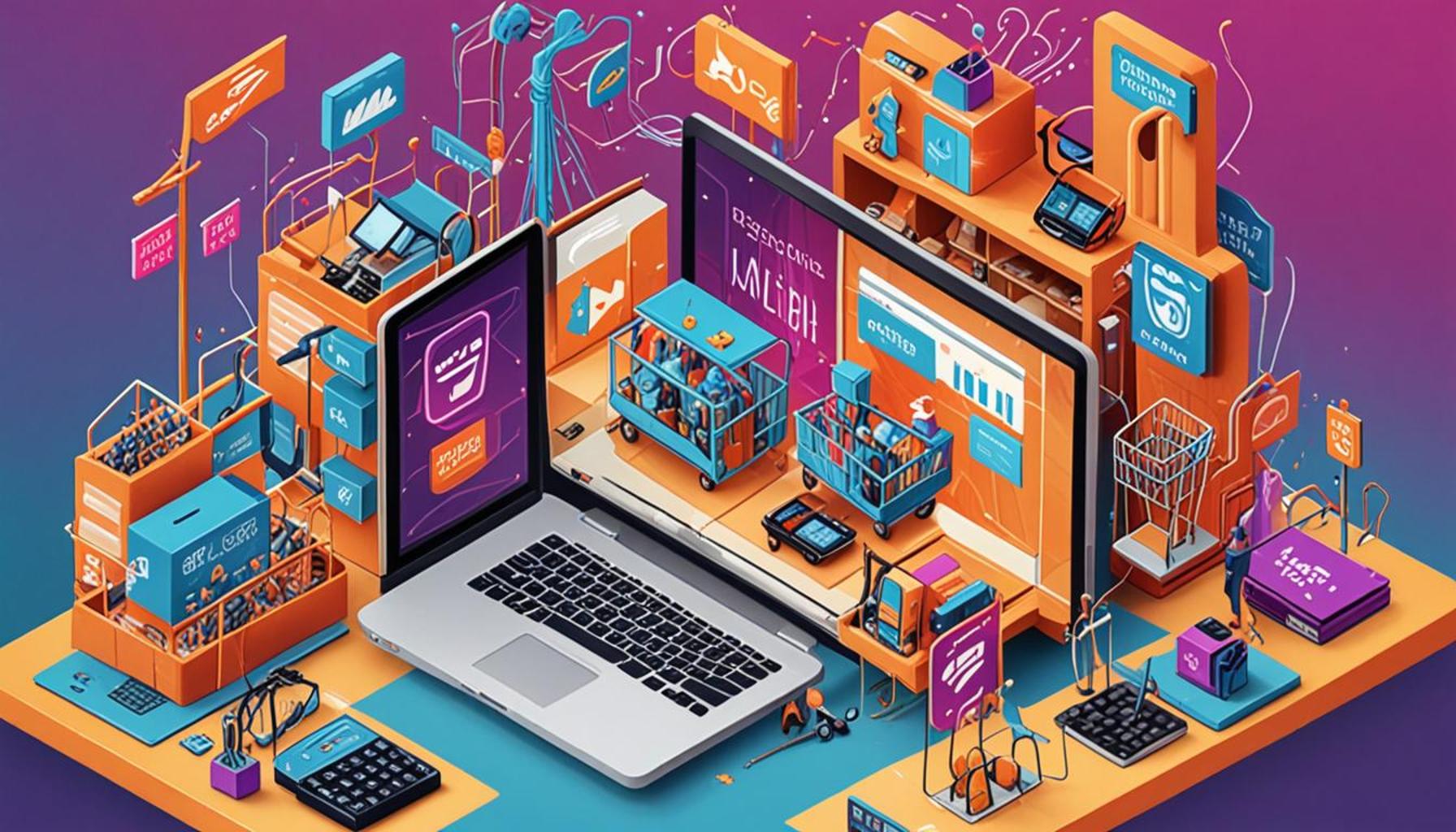The importance of digital literacy to access government benefits and promote online growth

Understanding Digital Literacy
As our world increasingly leans on technology for communication, education, and commerce, digital literacy emerges as a vital competency. It encompasses not just the ability to use digital devices and applications, but also the skill to critically evaluate information found online. In the U.S., where essential services such as government benefits often require online navigation, the importance of digital literacy cannot be overstated. Individuals lacking these skills may find themselves at a significant disadvantage, unable to access resources that are crucial for their well-being.
Challenges Faced Without Digital Literacy
The challenges connected to inadequate digital skills are profound and multi-faceted. For instance, consider someone attempting to apply for financial aid or social services online. Those who lack experience with digital forms may struggle to navigate complicated websites or submit documents properly, which can lead to missed opportunities for support that can alleviate financial strain.
Furthermore, limited access to crucial health care information highlights another significant hurdle. Many health services now provide online portals for patients to check appointments, access medical records, and understand treatment options. Without the ability to utilize these resources, individuals might miss critical health care services due to a lack of timely information.
In the employment sector, the repercussions are equally troubling. The process of applying for jobs and completing applications has largely transitioned to the online realm. Those without digital literacy face formidable challenges in exploring career development opportunities, potentially stunting their professional growth and limiting their earning potential.
Benefits of Digital Literacy
On the flip side, enhancing digital literacy can unlock a wealth of opportunities, facilitating not only personal growth but also contributing to economic growth within communities. Individuals equipped with strong digital skills can seamlessly engage with government platforms. This enables them to apply for benefits, renew licenses, and access public services more efficiently, reinforcing their position in society.
Moreover, individuals can discover a plethora of educational resources aimed at skill development. From online courses on platforms like Coursera to tutorials on YouTube, the digital landscape offers numerous avenues for learning that can lead to personal enrichment and improved job readiness.
Furthermore, the rise of online marketplaces provides a space for entrepreneurship. With adequate digital skills, individuals can establish their businesses, reach customers through social media marketing, and expand their market presence beyond local limitations. The ability to navigate these tools and platforms can transform lives, allowing individuals to harness their creativity and innovation.
As we continue to advance into an increasingly digital future, fostering these essential skills has never been more crucial. It calls for a collective effort from individuals, educational institutions, and community organizations to ensure that digital literacy is prioritized, empowering everyone to thrive in the modern world.
LEARN MORE: This related article may interest you
Navigating Government Benefits in a Digital Age
In the age of information, the ability to navigate digital platforms is not just a bonus; it’s a necessity for effectively accessing government benefits. Millions of Americans rely on various forms of support, including unemployment assistance, healthcare services, and housing aid. However, these crucial benefits are increasingly being made available primarily online, which presents both opportunities and hurdles. The inability to utilize digital tools can be a significant barrier, potentially leaving vulnerable populations without the assistance they need.
Firstly, the process of applying for government assistance typically involves a series of intricate steps. Individuals must not only know how to access the necessary websites but also how to navigate them effectively. For instance, the Social Security Administration and state welfare websites require users to create accounts, fill out forms, and submit documentation—all of which can be daunting for those lacking digital skills. In many cases, users might face long wait times on phone support or even in-person visits—not to mention the stress and confusion that can come with these hurdles.
Accessing Essential Services
The digital world is rife with accessible resources if one has the skills to find them. For example, the Health Resource and Services Administration now emphasizes online platforms to inform users about their healthcare options, eligibility criteria, and application processes. This can make a meaningful difference to someone seeking medical care or benefits during times of crisis. Yet, for those who are not digitally literate, the potential for missing out on vital healthcare services looms large.
One of the notable aspects of enhancing digital literacy is its impact on employment prospects. As more businesses utilize online platforms for employment applications, job seekers without the required skills face a disadvantage. A study conducted by the Pew Research Center found that nearly 80% of job postings in the U.S. require applicants to apply online. This shift highlights the urgent need for individuals to familiarize themselves with not only job application processes but also the use of professional networking websites like LinkedIn, where opportunities often proliferate.
- Government Websites: Many benefits require online applications through specific portals.
- Healthcare Portals: Access to health records and appointment scheduling typically occurs online.
- Employment Opportunities: Vast majority of job applications are now submitted through online forms.
In summary, digital literacy serves as a gateway to not only essential government benefits but also the broader economic landscape. The implications of being digitally illiterate are far-reaching and could potentially hinder personal advancement, social mobility, and economic growth. In an era where almost every aspect of life intersects with technology, failing to grasp the essentials of digital engagement risks relegating individuals to a marginalized position in society. Therefore, fostering these skills should be viewed as a priority not just for individuals, but for community development as a whole.
| Advantage | Description |
|---|---|
| Enhanced Access to Services | Digital literacy enables individuals to easily navigate online government portals, streamlining the application process for crucial benefits. |
| Increased Employment Opportunities | Understanding digital tools not only helps users access government support but also equips them with skills necessary for the growing digital economy. |
Digital literacy plays a pivotal role in empowering citizens to tap into government benefits effectively. With an increase in online services, individuals who possess strong digital skills are more likely to find, apply for, and receive benefits such as unemployment assistance or healthcare subsidies. Moreover, the landscape of employment is shifting towards a digital-centric model. As organizations increasingly seek tech-savvy candidates, the ability to navigate digital platforms becomes essential. Therefore, fostering digital literacy not only facilitates access to government resources but also promotes broader opportunities in the job market. By enhancing these skills, individuals can better advocate for themselves and their families in an increasingly online world.
RECOMMENDED: Check out this similar article
Bridging the Digital Divide
The reality of today’s digital economy is that access to government benefits, educational resources, and job opportunities is is increasingly predicated on one’s digital literacy. However, a significant digital divide exists in the United States, with large segments of the population—particularly those in low-income communities, the elderly, and rural residents—lacking the skills or infrastructure necessary to thrive online. According to a 2021 report by the U.S. Department of Commerce, nearly 25% of households with an income below $20,000 do not have internet access. This exacerbates existing inequalities and limits their access to essential services.
Moreover, as the nation continues to embrace telehealth services, the ability to effectively use digital health platforms becomes crucial. A study conducted by the American Medical Association indicated a rise in telehealth visits by over 600% during the COVID-19 pandemic. Yet many low-income individuals, who are often those most in need of healthcare services, find themselves ill-equipped to take advantage of these innovative solutions. A lack of understanding around how to engage with interactive tools can lead to missed medical consultations and fewer health management opportunities.
The Role of Education and Training
Addressing the gap in digital literacy requires educational initiatives and training programs tailored to various demographics. Schools and community centers can play a pivotal role in fostering skills that will enable individuals to access government services. Programs like Adult Basic Education and nonprofit organizations focused on technology literacy can help local communities gain essential skills. Research from the National Skills Coalition shows that investing in digital skills training can yield returns not only for individual participants but also for the wider community, creating a more skilled workforce and driving economic growth.
Government Initiatives and Support
The government has begun to recognize the need for digital literacy and has initiated programs tackling this issue. For instance, the Federal Communications Commission (FCC) launched the Emergency Broadband Benefit, aimed at helping low-income families access high-speed internet. This effort directly supports the need for connectivity, but it must be complemented by programs that teach users how to make the most out of their new internet access. Without a concerted push for education alongside access, many individuals will still find themselves disconnected from critical resources.
- Digital Literacy Training: Essential for empowering citizens to utilize government resources effectively.
- Telehealth Accessibility: Benefits many, but requires users to be comfortable with technology.
- Community Support Programs: Critical in bridging the gap in skills and knowledge for underserved populations.
Furthermore, as the landscape of remote education continues to evolve, digital literacy becomes essential for students of all ages. In community colleges and vocational schools, incorporating digital literacy courses can equip individuals not just for personal advancement but also for a future workforce that is increasingly reliant on tech-savvy skills. By understanding the use of learning management systems, online research tools, and professional collaboration platforms, students become equipped to navigate the modern job market more successfully.
In essence, the establishment of robust digital literacy initiatives is fundamental to making government benefits accessible and enhancing community growth. It is not merely about accessing websites or filling out forms; it is about empowering individuals and fostering a culture of social mobility through education and support. As we move forward, prioritizing this education will be vital for creating inclusive pathways to economic stability.
SEE ALSO: Click here to read another article
Conclusion
In conclusion, digital literacy is undeniably essential in navigating the complexities of the modern landscape, where access to government benefits and resources increasingly depends on tech-savvy skills. As the digital divide persists, with vulnerable populations facing significant barriers, the need for targeted educational initiatives and community support is paramount. By equipping individuals with the skills necessary to engage with online services, we empower them not only to access vital government assistance but also to thrive in a digital economy.
Moreover, with the ongoing shift towards telehealth and remote learning, it is clear that a comprehensive approach to addressing digital literacy can foster not just individual advancement, but also broader community growth. Investing in programs that promote technological proficiency will yield a skilled workforce, enhancing economic stability and reshaping our society for the better.
As policymakers, educators, and community leaders continue to explore innovative ways to bridge this critical gap, the importance of empowering users to leverage technology cannot be overstated. The journey towards a digitally inclusive society is not merely about increasing access to the internet; it is about ensuring that everyone—regardless of income, age, or geography—has the opportunity to partake in the benefits of a digital world. By prioritizing digital literacy now, we can lay the groundwork for a more equitable future, where all individuals can fully engage with and contribute to the economy and society at large.



